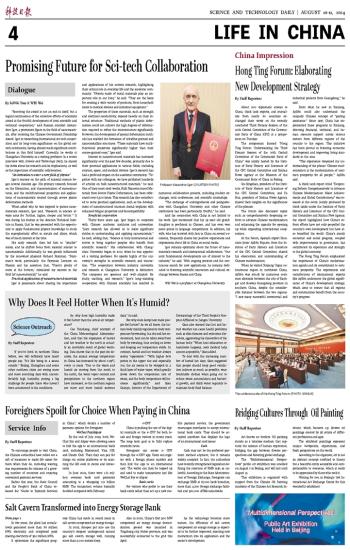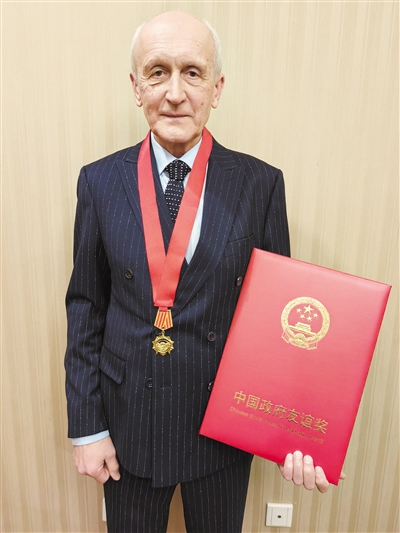
 |
| Professor Alexandrov Igor. (COURTESY PHOTO) |
"Receiving the award is not an end in itself, but a logical continuation of the collective efforts of scientists aimed at the fruitful development of joint scientific and technical cooperation," said Russian scientist Alexandrov Igor, a prominent figure in the field of nanomaterials, after receiving the Chinese Government Friendship Award. Igor is researching international sci-tech cooperation and its long-term significance on the global sci-tech community, having already made significant contributions in this field himself. Currently, he works at Changzhou University as a visiting professor. In a recent interview with Science and Technology Daily, he shared his views about his research and its implications, as well as the importance of scientific collaboration.
"An invitation to enter a new field of physics"
Igor's journey on the path of material science began several decades ago. His primary research focused on the fabrication, and characterization of microstructures, and the multifunctional properties and applications of nanomaterials created through severe plastic deformation methods.
When asked why he was inspired to pursue nanomaterials research, Igor said, "Research in science always aims for 'further, higher, deeper and better.'" It was during his studies at the Aviation Technical Institute in Russia, that he was presented with the opportunity to apply fundamental physics knowledge to study the superplasticity effect in metals and alloys, which was of much interest at the time.
His early research then led him to "smaller" scales, and he shifted focus from material science to nanomaterials. Additionally, he was greatly influenced by the renowned physicist Richard Feynman. "Feynman's work, particularly the Feynman Lectures on Physics and his assertion that, 'There's plenty of room at the bottom,' stimulated my interest in the field [of nanomaterials]," he said.
Practical applications of nanostructured materials
Igor is passionate about sharing the importance and applications of his current research, highlighting their critical role in everyday life and the academic community. "Objects made of metal materials play an important role in our lives," he said. "They are the basis for creating a wide variety of products, from household items to medical devices and industrial equipment."
The properties of these materials, such as strength and electrical conductivity, depend heavily on their internal structure. Traditional methods of plastic deformation could not achieve the high degrees of deformation required to refine the microstructure significantly. However, the development of special deformation methods has enabled the formation of ultrafine-grained and nanocrystalline structures. "These materials have multifunctional properties significantly higher than their coarse-grained ones," Igor said.
Interest in nanostructured materials has increased significantly over the past few decades, primarily due to their potential applications in various fields, including aviation, space, and medical devices. Igor's research has had a profound impact on the academic community. "Together with my colleagues, we have published hundreds of articles on bulk nanostructured materials," he said. One of their most cited works, Bulk Nanostructured Materials from Severe Plastic Deformation, has been referenced over 6,500 times. This research has also contributed to some practical applications, such as the development of nanostructured titanium dental implants with enhanced fatigue properties and biocompatibility.
Beneficial cooperation
Thirty-three years ago, Igor began to cooperate with Chinese academic institutes and universities. "Joint research has allowed us to make significant strides in understanding and applying nanomaterials," he said, adding that, "Science is truly international and serves to bring together peoples who benefit from scientific research." His collaboration with Changzhou University began in 2017, when he was appointed a visiting professor. He speaks highly of the university's strengths in scientific research and innovation. "The cooperation between industry, university, and research at Changzhou University is distinctive. The campuses are spacious and well-adapted for study, teaching, and research." Igor's long-standing cooperation with Chinese scientists has resulted in numerous collaborative projects, including student exchanges, joint conferences, and scientific internships.
"The exchange of undergraduates and postgraduates with Changzhou University and other Chinese institutions has been particularly fruitful," he said.
And his connection with China is not limited to his work. Igor mentioned that his 13-year-old granddaughter is proficient in Chinese, and has even won some prizes in language competitions. In addition, his wife, who has traveled with him to China on several occasions, frequently shares her positive experiences and impressions about life in China on social media.
Igor remains optimistic about the future of nanomaterials research and international collaboration. "Our joint fundamental developments are of interest to the industry," he said. With ongoing projects and the continuous search for new applications, he remains dedicated to fostering scientific innovation and cultural exchange between Russia and China.
WEI Wei is a professor at Changzhou University.







